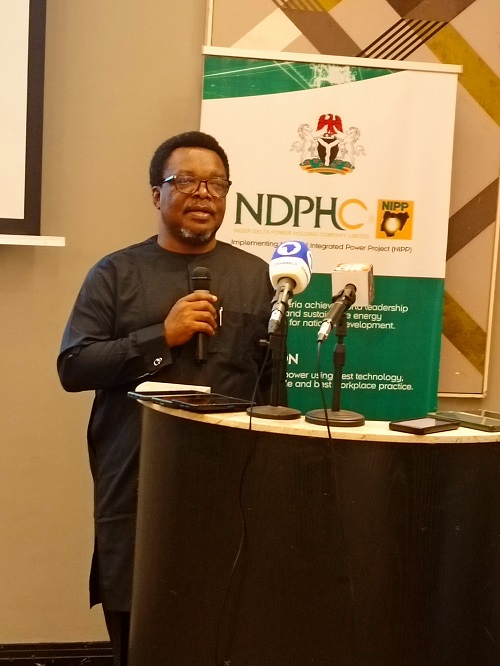Mr. Chiedu Ugbo, MD/CEO of NDPHC
…The Genco is owed over N180bn debt
-Felix Douglas
The Managing Director and Chief Executive Officer of Niger Delta Power Holding Company Limited, (NDPHC) Mr. Chiedu Ugbo, made it known when speaking with journalists in Lagos that the company is living up to expectations to ‘Light Up Nigeria’.
In spite of being owed over N180bn debt, the Genco is poised to light up Nigeria by addressing some of the electricity challenges in the country.
He decried that the indebtedness had negatively affected the speed at which the company would have improved power services in the country,
According to Ugbo: “There is also low invoice payment for energy generated to the grid. There is huge indebtedness by the market to NDPHC in hundreds of billions for unpaid invoices. NDPHC is also not paid for availability but only as dispatched thereby depriving NDPHC of hundreds of billions (N) since 2015 when transitional electricity market (TEM) was declared.”
Noting that NDPHC also owes some stakeholders, Ugbo said the Federal Government under President Bola Ahmed has taken a soft and citizens’ oriented approach by not increasing tariffs but assured that it would find a way to address the shortfalls in payment as per the actual consumption and the tariff.
The NDPHC boss stressed further, “To reasonably resolve the challenges to power plants’ operations and increase electricity supply to homes and businesses, NDPHC’s Light-up Nigeria initiative is to explore not only the opportunities under the Eligible Customer Regulations and Electricity Act 2023 but also bilateral power sales in collaboration with Discos and other bulk purchasers under trading arrangements will ensure that investment is mobilized for end-to-end solutions that will guarantee that electricity is delivered to customers and NDPHC is paid for the electricity generated.
“At the core of NDPHC’s initiatives is to prioritise high-value power sale opportunities with bulk purchasers and Discos, which under Nigerian Electricity Supply Industry (NESI) have significant power supply demands across their franchise areas. The rationale for this approach is that projects delivered in collaboration with these potential bulk purchasers are likely to generate significantly greater volumes of power sales under bankable arrangements.”
NDPHC is the implementing entity for the National Integrated Power Project (“NIPP”).
He noted that NDPHC commenced the design and development of 10 NIPP power plants in 2006. Eight (8) of the power plants have since been completed and are mostly operational. Two (Egbema and Omoku) are yet to be commissioned. Alaoji’s gas turbines (4 units) have been commissioned while its steam turbine is under construction.
He stated that the foregoing achievements, NDPHC’s operations are hampered by a number of systemic challenges that have significantly affected its cash flow but which put differently present good private investment opportunities.
According to him, these challenges also present opportunities for investments.
On the transmission constraints, he identified inadequate transmission and distribution grid capacity to evacuate energy generated from the power plants as a challenge.
He noted that in 2022, transmission and distribution available capacity was estimated at about 5,500MW.
He, however, said that NDPHC is currently allocated a maximum dispatch space of 975MW (peak period) and 757MW at off-peak (despite often being substantially mechanically available).
Ugbo said: “Talking more about constraints, evacuation limitation is further exacerbated by systems operations (SO’s) frequent start-up & shut down instructions to the plants ostensibly for frequency and load control to ensure system safety and reliability but resulting in increased turbine stress, more unscheduled outages, and significant maintenance costs.
“Another challenge is gas supply and transportation constraints. There is an unavailability of sufficient volumes of gas to guarantee generation up to the Transmission Company of Nigeria (TCN) allocated evacuation capacity of 975MW let alone the full capacity of its power plants.
“Calabar is the only plant with a full gas supply. Plants in the western axis require about 150MMSCF/day to meet the TCN-allocated evacuation capacity of 535MW (Peak).
“Gas supply to western axis power plants is further challenged by low pressure on NGIC gas pipelines –ELPS & Oben-Ajaokuta. Gas suppliers want higher gas tariff beyond industry approved gas tariff ($2.50 vs. $2.18).”
He explained further that the Light UP project of the company is waxing stronger, “We have started with Ibadan Electricity Distribution Company (IBEDC) to supply Ota Industrial Clusters,” while many other projects are also on with other DisCos.
The Genco ensures that electricity transcends the country and is enjoyed by both the rich and poor.


Comment here